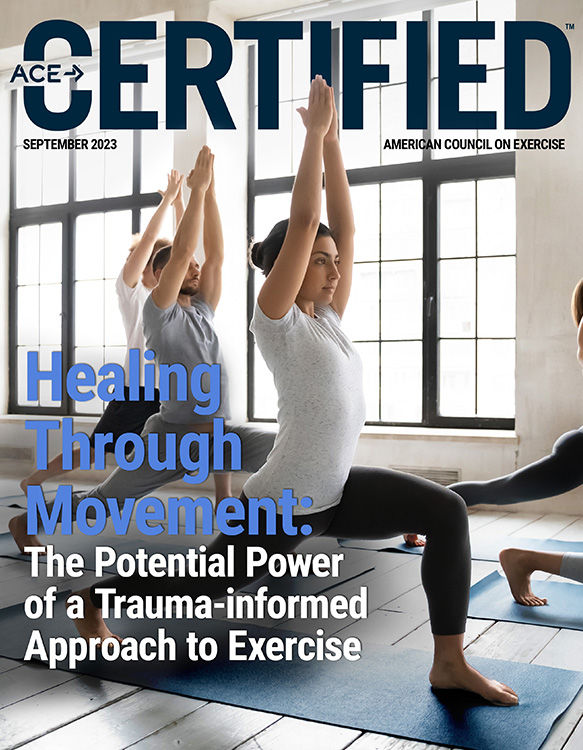
Study: Why Female Athletes May Need More Calories

As a health and exercise professional, you know that when it comes to athletic performance, diet and training must go hand in hand to achieve the best results. Most athletes know this, too, and many of them closely monitor their energy intake and training. However, a new study from the Department of Public Health at Aarhus University in Denmark shows that the bodies of female athletes are negatively affected when the athletes consume too little energy through their diet relative to their training volume, says doctoral student Mikkel Oxfeldt who, along with associate professor Mette Hansen, coauthored the study.
Although a focus on weight and weight loss is not exclusive to women or female athletes, many feel increased pressure to keep their weight down and, as a result, will turn to unhealthy methods to do so. For example, one study found that female athletes have more concerns about their weight and a higher urge to improve their appearance than male athletes. Additionally, they used more pathogenic weight-control methods than their male counterparts.
In collaboration with colleagues from the University of Copenhagen and University of Southern Denmark, the researchers behind the current study are investigating how physical performance, the immune system and metabolism are affected by an insufficient energy intake.
The Study
For this study, the researchers focused on learning what happens when female athletes lower their caloric intake while also increasing their training volume. Thirty female athletes were recruited to participate and randomly assigned to either a low-calorie or “optimal energy availability” group. During the 10-day study period, all participants completed a cardio and resistance-training program. All the women started the study right after the start of their menstrual period and followed a very controlled training and diet regimen for three weeks.
“Under the supervision of the researchers, the participants carried out individual training programs aimed at increasing muscle mass, strength and overall fitness, explains Oxfeldt. “The women’s meals were also provided by us. By controlling their training regimen and their diets, we were able to see how much energy they expended and what they ate during the study.”
According to Oxfeldt, this is the first time in which both the diet and training of a group of fit women has been regulated to this extent for a study. Additionally, “All participants drank doubly labelled water, which is enriched with a trace material,” he says. “When we combine this tracer technique with the retrieval and subsequent analysis of muscle tissue samples, we can gain detailed insight into the muscles’ response to the experimental protocol.”
The Results
Previous research indicates that, at times, both elite female athletes and active women, either consciously or unconsciously, don’t have an energy intake that matches their energy expenditure when training. This study, says Oxfeldt, “shows that insufficient energy intake can negatively affect muscles’ ability to respond to training.”
Indeed, after just 10 days of low energy intake, the researchers began seeing changes to the female athletes’ hormonal systems, such as a decrease in metabolic hormones followed by a decrease in metabolism. Additionally, participants’ body composition, nitrogen balance, blood biomarkers, resting metabolic rate and muscle protein synthesis all decreased during that same time period.
The study clearly shows that female athletes should avoid reducing their energy intake too much. In fact, says Oxfeldt, they should actually be increasing their energy intake if they increase their training volume.
“When you don’t get enough energy from your diet, your body will begin to pare down processes that require a lot of energy—just like a mobile phone that goes into battery-saving mode. We know from previous studies that it can cause some women’s periods to stop. However, our results show that other processes in the body, such as building new muscle proteins, are also affected.”
What the Research Means to Health and Exercise Professionals
Oxfeldt and his colleagues believe it is necessary to confront the idea that weight loss leads to medals, when in fact weight loss can negatively impact a number of the body’s systems, including the muscular system.
“In recent years, we’ve heard about public weigh-ins within some elite sports,” says Oxfeldt. “They are part of promoting a culture in which some women are constantly trying to lose weight. However, our results show that this focus on weight loss can have short and potentially long-term negative consequences for women, both in relation to their health and training results.” The researchers hope their findings will offer athletes and coaches with a more nuanced picture of possible side effects of not consuming sufficient calories. They also hope to one day be able to establish whether there is a difference between how women’s and men’s bodies react to inadequate energy intake.
A constant focus on weight is an integral part of diet culture, which is the insidious belief that things like appearance and having an “ideal” body shape are more important than any aspect of well-being. Diet culture is about image and restriction. As a health and exercise professional, it is beyond your scope of practice to recommend specific diet plans, but you are uniquely positioned to use evidence-based information to help your clients reach their goals. Whether your client is male or female, an athlete or a beginning exerciser, instead of restricting, focus on what you can add to bring a greater balance to a client’s eating patterns, exercise routines or stress-management practices and consider all aspects of their health and wellness.
Below you’ll find additional guidance on helping your clients find a healthy balance that staves off burnout and overtraining, while also supporting their competitive and wellness goals.
- Personalized Approach: Understand that every athlete is unique, and their energy needs can vary based on factors like training intensity, body composition, metabolism, and hormonal fluctuations. Avoid adopting a one-size-fits-all approach to diet and training.
- Energy Balance: Emphasize the importance of maintaining an appropriate energy balance. Urge your clients to consume enough calories to fuel their training demands. Creating a calorie deficit that's too large can lead to negative health effects, including changes in hormonal balance and muscle response.
- Avoid Extreme Restrictions: Encourage clients to avoid extreme calorie restrictions or crash diets. Rapid weight loss can impact performance, hormone levels and overall health. Instead, promote a gradual and sustainable approach to managing weight and body composition.
- Nutrient Timing: Educate your clients on the significance of proper nutrient timing. Consuming adequate carbohydrates and protein around training sessions can help support energy levels, muscle recovery and performance.
- Monitoring and Assessment: Work closely with clients to monitor their energy intake, training volume and overall well-being. Regularly assess their physical, mental and emotional health to help identify any potential issues arising from inadequate energy intake.
- Education: Provide clients with accurate and evidence-based information about the importance of energy intake for optimal performance and health. Address misconceptions around weight loss and its impact on athletic success.
- Communication With Coaches: Collaborate with your clients’ coaches to ensure they understand the potential negative consequences of extreme energy restriction on their athletes’ performance. Encourage coaches to focus on performance gains and overall health rather than just weight loss.
- Body Positivity: Foster a culture of body positivity and self-acceptance among athletes. Shift the focus from solely weight-related goals to encompass broader measures of success, such as strength, endurance and skill improvement.
- Rest and Recovery: Highlight the significance of proper rest and recovery. Inadequate energy intake can hamper the body’s ability to recover from training, potentially leading to increased risk of injuries and burnout.
- Collaboration With Medical Professionals: If a client is experiencing menstrual irregularities, hormonal imbalances or other health concerns, consider advising them to speak to a medical professional who specializes in sports medicine and women’s health.
- Long-term Health: Stress the importance of considering long-term health and well-being. While short-term weight loss might be promoted in certain contexts, it is crucial to balance such goals with the potential long-term negative effects on health and performance.
- Research Awareness: Stay up-to-date with relevant research and studies in the field of sports science and nutrition. This will help ensure that you are providing evidence-based guidance to all your clients.
Remember that the goal is to support female athletes in achieving their best performance while maintaining their overall health. A holistic approach that considers nutrition, training, recovery, and mental well-being is key to their success.
Expand Your Knowledge
Learn from five industry experts speaking from their unique expertise about the physiological, biomechanical, and behavioral aspects of coaching and training women—a group that accounts for more than 50% of gymgoers, according to the 2020 IHRSA Global Report. Refine your coaching expertise, expand your reach and move your career forward.
Strategies for Training Female Clients – Course Bundle
Every client has unique needs and circumstances, and this could not be truer than when it comes to training female clients. The many life cycles of a woman are powerful and unique—and when your training techniques reflect that, they’ll get the most optimal results. The Strategies for Training Female Clients course bundle will give you a holistic approach to improving your female clients’ fitness regimen and overall health by understanding their current stage in life, along with their health and fitness goals.

 by
by 



